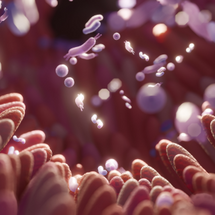Posted by Joyce Harman, DVM on Nov 9th 2023
Fixes for Gut and Microbiome Health
Antibiotics are used very liberally in the horse world, and they may be needed in many cases. However, it's important to realize that they do some damage to the gut in the process. The good news is that there are many natural ways to heal the gut, repair the immune system damage and improve the long-term health of the horse and it's microbiome.
What is the microbiome and why should we care?
The intestinal tract contains bacteria and many other microbes, (the microbiota), designed to digest food, manufacture vitamins and make minerals available. The genetic makeup of these microbiota is called the microbiome. The microbiota grow on dietary fiber in the digestive tract called prebiotics, not on the intestinal wall. The populations of microbiota are quite variable between horses, even those kept under similar feeding programs. There is a great deal of variation throughout the digestive tract within each horse. Because they reproduce rapidly, the microbial populations are susceptible to changes in the diet and environment. Research into the equine microbial populations is just beginning, along with the understanding of how the balance of the microbes relates to health and disease.
When the digestive tract microflora become unbalanced, the bacteria are not present in the correct proportions and incomplete digestion occurs. With incomplete digestion and poor-quality feeds, the pH can become altered, leading to this migration of bacteria into inappropriate places, or to overgrowth of microbes that are not supposed to be present in a certain location.
Antibiotics damage the microbiota by killing all microbes indiscriminately. In this process the gut wall also becomes inflamed creating a “leaky gut” situation. When this occurs, the gut wall actually becomes leaky and compounds can pass through it into the body in a form that is inappropriate or even toxic.
Immune system effects of microbiota
Microbes play a variety of roles in the immune function in the gut. The good ones directly compete for space and can overcome pathogenic bacteria by their physical presence. They can also prevent pathological bacteria from entering the lining of the gut. They also have been shown to play a direct role in the immune system in ways we are just beginning to understand.
When we give antibiotics, we are trying to kill off the bad bugs that could overwhelm the immune system, leading to an infection. This could be an infected wound or something like Lyme disease. We tend to just assume the body will recover and be healed, however, once that microbiome is damaged, the immune system is also damaged. In some cases, in animals with a strong microbiota and immune system, the immune system recovers, and the horse stays healthy. In many cases, the immune system and microbiota never recover and slowly over time the immune system weakens and health problems increase. In the case of Lyme disease and similar deep, chronic infections, the organism continues to deplete the immune system and the horse never seems to recover properly.
Repair the gut, heal the horse
Repairing the gut microbiota is the most important thing you can do for your horse after a course of antibiotics. It is also important if your horse has any chronic diseases (skin issues, colic's, allergies) , since we often do not know our horse’s lifetime exposure to antibiotics. It's possible that as a foal, she was treated for pneumonia, or if there is a scar present anywhere it's likely that antibiotics were used liberally before you purchased him.
If you wish to know details about your horses microbiome, a British company, www.equibiome.org, has kits that use DNA analysis to tell you about the microbial balance and give you suggestions as to what to use to correct it. They have international kits, though some of the recommended products you need recreate in your own country.
You do not have to do a test to repair the gut microbiota. A combination of healthy feeds, pre and probiotics, as well as some herbs and nutritional supplements can repair the gut wall and the immune system.
Feeds
Horses fed a forage-based diet tend to have a healthier and broader population of microbes than grain-fed horses. Switching to a whole food diet, instead of processed feed will make a big difference. Unless you have a hard keeper that needs a lot of calories, most horses do well with a moistened hay pellet mixed with a vitamin/mineral supplement as their “feed.” They think they are getting a meal in their bucket, and you can add any other supplements you wish.
Prebiotics
Prebiotics are short chain fibers that the microbiota grow on. One of the most common is inulin. It's found in the plant chicory and can be fed as a concentrated powder (20-30 gms twice a day) if you do not have much chicory growing nearby. Others are fructo-oligosaccharides (FOS), beta-glucans (from mushrooms or things like oats and barley), and mannan-oligosaccharides (MOS). These can be found in some of the probiotic supplements on the market.
Prebiotics can also be in the form of compounds from humus such as fulvic and humic acids. These are from the soil, and the microbiota that actually live and reproduce in the gut are similar to those that naturally occur in the soil, rather than those that we commonly supplement. So, these soil compounds help support the microbiota.
Herbs, plants
Herbs can be added for a variety of reasons because they contain many compounds that help heal the gut wall as well as supply the prebiotics. Diverse pastures supply variety of plants/herbs that the horse can select as needed. If that is not possible, try planting a patch of herbs to graze for short periods of time or add seeds to the pasture to increase plant diversity. Plant small patches in areas away from the high traffic paths so the plants have a chance to grow. You can also grow plants in your own organic garden with great soil microbes and feed carrots and other root crops without washing the soil off.
Other herbs such as marshmallow, aloe, fenugreek, chamomile, dandelion and ginger can all be used to help heal the gut wall. Slippery elm is commonly used, but is an endangered herb, so if it's used, it needs to be harvested ethically, or just use marshmallow-it works just a s well. The company you buy from should be able to confirm the sourcing.
Nutrients
There are many nutrients that help heal the gut wall and repair the immune system of the gut. Glutamine is an amino acid that is fuel for the enterocytes (the cells that make up the gut wall), so the addition of 20-30 grams twice a day can be helpful, especially if the horse has been ill and not eating well during the antibiotic usage. It can also be helpful in lower doses as part of a supplement.
Colostrum is an important nutrient that acts directly on the immune system in the lining of the gut wall. Colostrum has become very popular but should only be used if it is sourced from grass-fed cows that are not stressed. Commercial dairy cows are under a huge amount of stress and colostrum from them will not be as healthy for the immune system.
Probiotics
Probiotics are always useful as part of the damage control and repair process. During antibiotic usage, the drugs will be killing off the probiotics you are adding. However, it is still beneficial to feed them, knowing that all you are doing is some damage control. The real repair comes after the antibiotics are finished. If you can feed probiotics at a different time than the antibiotics, that is great, but not always possible in boarding situations or at home when you have to go to work and feed twice a day. Probiotic supplements are primarily helping create a positive environment for the microbiota to thrive, rather than replacing the damaged bugs.
Probiotics should be free from additives, fillers, sugars and preservatives. If possible, it helps to have them microencapsulated to prevent breakdown on the way to the mall and large intestines, though products without microencapsulation do help.
Conclusion
Repair of the gut after the use of antibiotics is important. The health of the gut is really at the center of general health, as research is now proving that without a healthy microbiome, whole body health suffers. It takes a minimum of three months to heal the gut after a simple short course of antibiotics, and much longer than that after months of antibiotics, or repeated bouts like many Lyme and chronic disease sufferers are given. In the end, if you take the time and spend the money soon after antibiotics, you will save aggravation and money in the long run with a healthier horse.

